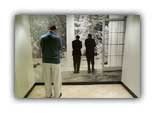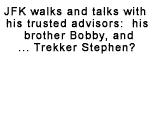 |





The Peter Jennings Report
Remembering Jack
The JFK Library
|
 |

Considering Kennedy in Camelot

Sprite commercials urge us to drink their soda by telling us "Image is Nothing." They tell us that we should "obey [our] thirst." It's a smart ad because it makes us believe that we're drinking Sprite for the "right" reasons, and we can fall in love with Sprite because they're telling us that it's ok not to. Sort of.
|

Don't Forget Dessert!
|
Advertising is tricky, but it can be very effective. It's all about selling something to the public with catchy slogans, pretty pictures and slick speech. A well-planned advertising campaign can convince you to buy expensive tennis shoes, a certain CD, or the president of the United States.
Yes, the President. It was the media that helped America fall in love with John F. Kennedy. His presidential debates with Richard Nixon were the first televised debates in our America's history. Kennedy himself believed that he wouldn't have won the presidency without them. For the first time, the American public was easily able to see how a candidate walked and talked, how he wore his clothes, and how attractive he was. John F. Kennedy had it all: he was funny and intelligent, self-assured and calm, even under the pressure of the televised debates. Above all, he was strikingly handsome. Kennedy was young and in great physical shape with a healthy tan and thick hair. Women adored him. Children looked up to him. Men wanted to be him.
After winning the 1960 election, Kennedy continued to make America swoon. His life seemed idyllic. Kennedy moved into the White House where his family was seen as picture perfect. He seemed to balance the presidency easily with his beautiful wife and two adorable children, while still finding time to go sailing and swimming, then entertain musicians, Nobel Prize winners, Hollywood stars, and heads of state.
But behind the charm and the charisma of Kennedy's media image, what was his short presidency all about? We remember John F. Kennedy as a great leader, but we don't often stop to think about why. A glimpse behind the attractive image reveals that although Kennedy did some good things for our country, he did some questionable things as well. We owe it to history to look at the man as a whole.
I read the book The Dark Side of Camelot, written by Seymour Hersch, to better understand the reality of Kennedy's stressful life. Image certainly was everything to Kennedy. He came from a rich, powerful Boston family, and was expected to live up to the athletic and intellectual expectations of his father. Unfortunately, Addison's disease, a serious illness that weakened his immune system, often got in the way. In addition, Kennedy suffered from chronic back problems that required him to wear a brace much of the time. Kennedy was so concerned about his image that he hid his disease and back problems from the public, but he often took steroids and other strong medications to deal with the daily pain. He constantly strived to present a strong masculine front. Perhaps this had something to do with his affairs with women as well. Kennedy was reportedly the ultimate playboy when the First Lady was away, entertaining beautiful women at the White House pool, and receiving lovely ladies to his bedroom late at night.

|
 |
For the past eight years, ex-President Clinton's infidelity has sparked debate over whether a president's personal life and "character" should be brought into the public spotlight. In the 1960s, however, the line was clear: the President's personal life was his business, and not up for scrutiny under the media's magnifying glass.
Kennedy's personal life also stayed out of the spotlight because of everything happening in the 1960s. The decade was both silly and serious, and a passionate time of national change. While soldiers marched off to burn down villages in Vietnam, war protesters at home burned draft cards at the local courthouse. The Civil Rights movement drew national attention as a daily struggle for equality played out in schools, buses and lunch counters around the south. The Hippie generation came of age; the threat of Communism made the country shudder, man landed on the moon, and the Peace Corps sent its first volunteers off on a new type of national service.
It was a topsy-turvy time, marked by extreme viewpoints and dramatic behavior, and the decade's first president sported a character to match the mayhem. Kennedy was the youngest person ever elected president, and the first Catholic who had ever held the office. For these reasons alone, Kennedy's presidency was momentous. As for his policies, Kennedy handled the beginning of the 60's with a mixture of good decisions and bad ones.
His push for civil rights was very right and necessary, but his support for Black rights came only when public opinion absolutely demanded it. Because of that, some people see Kennedy's Civil Rights work as simply a reaction to the public rather than a real decision. Kennedy's fear of communism created several international blunders. Although he averted disaster during the Cuban Missile Crisis, he brought the world frighteningly close to nuclear war. With his anti-communist rhetoric, Kennedy escalated the inevitability of war in Vietnam. He allowed tensions to build with the Soviet Union so that a concrete wall was built to separate the American and Russian presences in Berlin, Germany. His macho need to overthrow Fidel Castro and Communism in Cuba led to the embarrassing Bay of Pigs fiasco. And then there was the Space Race. While Kennedy believed that it was important for the US to beat the Soviet Union in the race to the moon, many Americans felt that this need to one-up the Russians was a misuse of government funds and manpower. Kennedy did initiate a bill to create a federally sponsored opportunity to volunteer in foreign countries, which he proposed as the Peace Corps. This amazing organization is perhaps Kennedy's best legacy.
No matter what we've learned about Kennedy since his 1963 assassination, Americans continue to revere him. His gravesite is one of the most visited destinations in Washington D.C. An eternal flame burns constantly behind his headstone at Arlington National Cemetery, reminding people of the energetic man whose life was taken way too soon. We know about his affairs and his secrets and his bad decisions. We know that he was not all the goodness that we had hoped him to be, and still our country loves him.
Image may not be everything, but it counts for a heck of a lot in America. JFK has become an icon for us - beautiful, young, and tragically dead before his time. We are enamored of icons. We idolize Hollywood stars and sports heroes for their glamour, power and presence. Just like Elvis, James Dean and Marilyn, we see Kennedy as an icon in his glorious prime and we forget about the faults that were also a big part of him.
The history isn't accurate though, if we don't remember it all.
Rebecca
Please email me at:
rebecca@ustrek.org
Links to Other Dispatches
Jennifer - Q: What's better than a high paying corporate job? A: Bringing hope to Americans in poverty
Rebecca - Laying down the law of the land
Neda - Teaching democracy through the barrel of a gun
Stephanie - Working for peace is a fulltime job
Stephen - It's not a race. It's your life!
|



